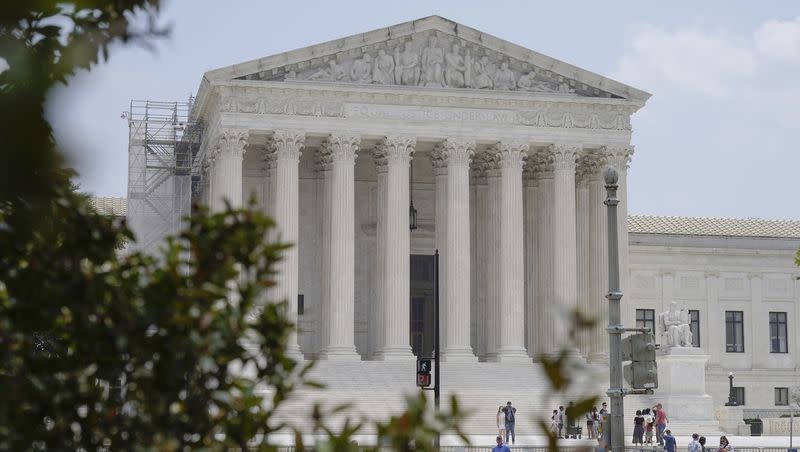Opinion: The web designer case is a free speech decision that protects everyone, gay and straight

- Oops!Something went wrong.Please try again later.
Imagine you are a gay website designer and you’re asked to design a website for a group advocating against same-sex marriage. If you refused, Friday’s Supreme Court decision in 303 Creative v. Elenis protects you against a zealous state official who might want to prosecute you for discrimination on the basis of sex or religion. Yet, because the fact pattern in 303 Creative is based upon the opposite scenario of a conservative religious website designer refusing to design a site for a same-sex wedding, the case is being widely characterized in the press as “anti-gay rights.”
This is a free speech decision that protects everyone, gay and straight, and stands for the proposition that the state cannot compel Americans engaged in expressive speech — even those operating small businesses — to say things they do not believe. It also protects us all from discrimination and harassment on the part of state bureaucrats tasked with enforcing anti-discrimination laws, who all too often enforce those laws in ways that intimidate and penalize the politically unpopular.
Related
As Justice Neil Gorsuch explains in his majority opinion, it stands for the proposition that public accommodations laws are not beyond the reach of the Constitution.
And yet, most of the press coverage has characterized the case as simply being pro-religion and anti-LGBTQ rights. For example, the New York Times headline on the story reads, “Supreme Court Backs Web Designer Opposed to Same-Sex Marriage,” and CNN’s headline says, “Supreme Court limits LGBTQ protections with ruling in favor of Christian Web Designer.”
The stories themselves often amplify this religion versus gay rights theme. Sounding a rare contrary note, the editorial board of the Wall Street Journal ran a headline stating, “303 Creative v. Elenis Is a Victory for Free Speech and Pluralism.” This gets closer to the actual meaning of the decision.
As Justice Gorsuch, writing for the majority, explains in the first paragraph of the decision, “in this particular case Colorado does not just seek to ensure the sale of goods or services on equal terms. It seeks to use its law to compel an individual to create speech she does not believe.”
As Justice Gorsuch and the majority conclude, the free speech provisions of the First Amendment make such government coercion unconstitutional.
It is telling that the Supreme Court excluded the religious claims of the website designer when it agreed to take the case, and focused exclusively on her free speech argument. All of the parties in the case agreed that Lorie Smith would serve all customers, including LBGTQ customers. They also agreed that the website design was “expressive” work that involved “original, customized” creation that would tell a particular story. What Ms. Smith objected to was being forced to communicate a message that she did not believe, in this case her views that marriage is between one man and one woman.
It should go without saying, you don’t have to agree with Ms. Smith’s personal beliefs to agree that the state should not force her to express views contrary to her beliefs.
As Stanford Law professor Michael McConnell has noted, numerous dressmakers declined to make an inauguration gown for Melania Trump when her husband was elected president, and nearly everyone thought it was important that these dressmakers had the freedom to decline the work. The same logic should apply to other artisans who are providing customized services, including bakers, photographers and website designers. Living in a pluralistic society includes the possibility that some people may not want to help us deliver messages that are important to us. This would include a baker who didn’t want to bake a cake depicting the Book of Mormon or the Angel Moroni. This is something we accept living in a diverse and pluralistic society.
The most important precedents here may be the flag salute cases from the 1950s where the court first ruled that children could be forced to recite the pledge of allegiance, and then a few years later, reversed course, stating (in language that Justice Gorsuch quoted in 303 Creative) that “if there is any fixed star in our constitutional constellation, it is that no official, high or petty, can prescribe what shall be orthodox in politics, nationalism, religion, or other matters of opinion or force citizens to confess by word or act their faith therein.”
Brett G. Scharffs is Rex E. Lee Chair and a professor of law at the J. Reuben Clark Law School, and director of the International Center for Law and Religion Studies at Brigham Young University.

